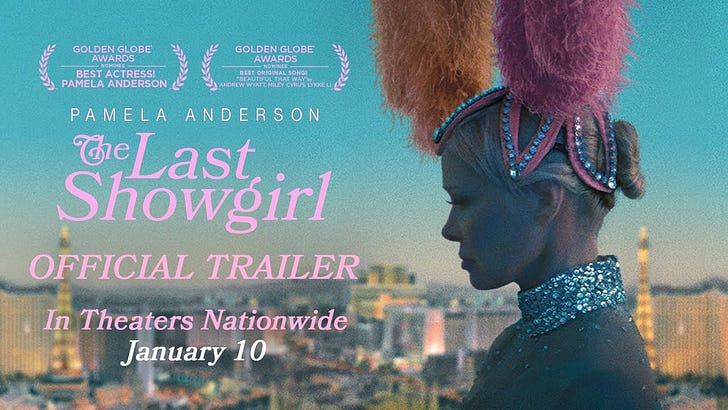The (Very) Last Showgirl
Pamela Anderson matters. Can a new movie better help us understand why?
A teaser dropped for the new Gia Coppola-directed film, The Last Showgirl, which stars Pamela Anderson as a once-ascendent, now-threadbare Vegas starlet at the wane of her career. I have no idea if this movie will be good — Coppola does not have a strong track record, imho — but the trailer itself was enough to provoke intense feeling in me. Some of that has to do with the setting and plot: alive in an uncomfortable time of American decline, I am always looking for art and culture that embodies how it feels to exist in the Trumpian era of crumbling empire, and I can’t think of a better lens for that than the increasing moral and physical decrepitude of Vegas and its landscape of entertainment, as symbolized by a glamour queen who has lost her proverbial shine but is hanging on the best she can nonetheless.
But the transcendence of the trailer, at least for me, mostly relies on Anderson herself, who has become something of a lodestar of mine. When I was a kid in the ’90s, no one transmitted the particular sparkle of American pop culture more than Anderson. As a gay kid, I was not fixated on her in the way, I suppose, most other boys of my age were, but I was fixated nonetheless. It’s hard to describe what stars mean to us when we’re young; my relationship to celebrity was always intuitive, not intellectual. I didn’t know why Mariah Carey, Britney Spears, or Anderson were special to me, but they were — I saw something in them beyond the superficial veneer through which they were mostly analyzed and understood. I remain devoted to and protective of them; maybe it’s projection, but while these grand female figures of ’90s pop culture were mostly seen to be vessels for sexuality, power, money, and scandal, I always saw vulnerability, integrity, and a kind of endearing strength that relies less on brute authority than it does honesty and authenticity.
I was lucky enough to interview Anderson last year around the release of a documentary about her, and even now, I get chills thinking about how lucky I am to get to sit face-to-face with someone like her. There is a dissonance to these moments: the symbol in your head meets the reality of the woman in front of you. Both can exist; the myth isn’t necessarily punctured, just contextualized. No, I’ve never exactly been a huge Baywatch fan, but in our era of celebrity, I believe that the creation of an image is as much a skill as anything else, and so I still see Anderson as an important artist with capable agency, adroit at weaving story and saga in the public eye and turning herself into a character in the larger soap opera of American life. But what struck me most about interviewing Anderson is that she was no better at putting into words what makes her special than I was. How can you give logical explanation to something profoundly magical, even when that something magical is you yourself?
That’s the job of poetry, I suppose, to give words to wizardry; someone like Robert Frost could do it in his own time, but people like him only come around once in a blue moon. I don’t expect The Last Showgirl to deconstruct every side and facet of the diamond that is Anderson’s public image and personal presence — that’s too tall an order — but I do hope it connects to something deeper than just the purely peripheral. We all have a relationship to the collective unconscious that is America’s fraying mythology, and we need stories and art to help us understand that relationship.
The Last Showgirl is meant to be something of a comeback for Anderson, who was almost brought down by the tabloids back in the ’90s — her career never fully recovered from the ghastly theft and publication of a sex tape she made with her then husband Tommy Lee. But no matter how good the film ultimately ends up being, here she is anyway, some 30 years later, the very last Rockette in the sad, unstable stage show that is our country. “Feeling seen. Feeling beautiful,” she says in character in the trailer. “That is powerful.” I’m not sure what we, as an audience, actually see when we see Anderson; with a little distance and perspective, maybe pop historians will get it better than we do. But I hope this movie brings us a little closer to the vision flickering in front of us, no matter how opaque and misty it may be.




What a great, thought-provoking piece, Alex. You've made me very curious about the film -- I hope it lives up to the quality of your writing about her!